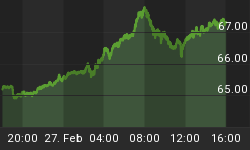Gold "Can't Break Range" as Euro Rates Stay On Hold, Quantitative Easing "Not Working"
THE PRICE OF GOLD slumped into the New York opening once again on Thursday, dropping sharply from above $940 for the second time in two days as the Dollar rallied and stock markets fell on worse-than-expected US jobless data.
The European Central Bank meantime voted to keep Eurozone interest rates on hold at 1.0%, despite a fresh flurry of weak economic data.
German, French and UK equities doubled their 1% morning losses on the lunchtime announcements.
The Euro sank against the Japanese Yen and unwound all of yesterday's gains vs. the Dollar at $1.40.
"Gold Prices did an about face [on Weds], testing the upper end of the recent 925/945 trading range," says the technical note from London market-makers Scotia Mocatta.
"Overall we remain neutral at the current levels due to the metal's inability to break out of this range."
"Our Gold strategy of selling into rallies stands," says Walter de Wet at Standard Bank, pegging technical support at $929 with resistance at $945.
"We also believe that any rumour that China wants to move out of the Dollar as reserve currency should be sold into as Gold moves higher. Even if China wanted to sell dollars, it would be very reluctant."
Wednesday's sharp rebound in Gold Prices to $945 faded overnight after a Beijing official refuted claims that China wanted discuss a new global reserve currency at next week's G8 meeting of political leaders in L'Aquila, Italy.
"For every 1% the Dollar depreciates against all other currencies," says de Wet at Standard Bank, "those countries holding Dollar reserves lose $43.52bn - and China would be the biggest loser by far."
Crunching central-bank reserves data today, "The US depended on China's central bank - and other official investors - far less over the last four quarters than it did in late 2007 and early 2008," writes Brad Setser for the Council on Foreign Relations.
The collapse in risk appetite during the financial crisis pushed private investment cash into Dollars and Treasury bonds, he explains, meaning that Washington didn't need to rely so much on Asian and petro-state funding to cover its deficit.
"The second quarter of 2009 will be different," says Setser. "Reserve growth seems to have resumed. [And] for all their faults, central bank reserve managers still seem to consider US Treasuries safer than other Dollar-denominated assets."
Just after the ECB's no-change decision on Thursday, the Euro stood 1.5¢ lower against the Dollar from the same time on Wednesday.
Ahead of the much-anticipated press conference with ECB chief Jean-Claude Trichet that follows, German Bund prices held onto early gains, pushing yields lower.
New data meantime showed Eurozone unemployment rising to a 10-year high of 9.5% in May, while input prices for Eurozone manufacturers showed their largest fall on record.
Down 5.8% from May '08, producer prices were pushed lower year-on-year as the sharp drop from 2008's peak in crude oil prices was compounded by the single currency's recent gains on the forex market.
US unemployment rose to 9.5% in June, today's Non-Farm Payrolls report said, with 3.3 million Americans losing their jobs so far in 2009.
"Although the threat of deflation has receded, it is still a danger," says John Wraith at RBC Capital Markets, speaking to the Financial Times in London, "and it is much harder to tackle deflation than inflation as we know from the Japanese experience."
Calling on the Bank of England to says boost its Quantitative Easing program - already worth 15% of all UK government debt, and the most aggressive attempt to boost the money supply amongst all major central banks - "The early signs are dangerously weak," says Wraith. "The Bank cannot afford to be too cautious."
Today the Swedish Riksbank cut its key lending rate to 0.25%, and offered SEK 100 billion ($13bn) in 12-month loans to domestic banks, saying it "should contribute to lower interest rates on loans to companies and households."
Last month the ECB lent €442bn to Eurozone banks for one year ($621bn).
"Right now gold is being pulled higher by Euro/Dollar and lower by crude oil," reckons day-trader Richard Muehlberg, reviewing recent chart patterns at Resource Investor.
"This action is good for day traders with tiger-fast reflexes. This action is bad for swing traders with tight stop losses."
Ahead of Friday's July Fourth shutdown in US markets, the Gold Price in Dollars dropped 1.5% as the New York opening drew near today.
For European and UK investors in contrast, also hit by a sharp drop in their currencies, the drop in gold equaled less than 0.7%.















